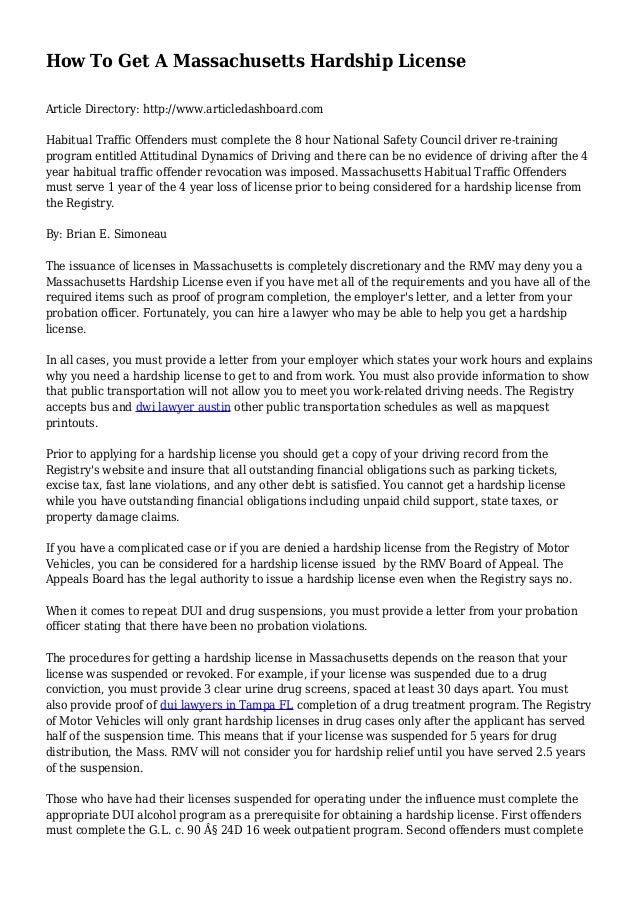Sample Letter For Hardship Drivers License

Depending on your state, you may be eligible to apply for a hardship license, or what is also referred to as a hardship permit or a restricted learner's permit. Not all states offer hardship licenses for teen drivers; usually, these licenses are restricted to rural states. Spectra plus sc keygen crack serial number key.
Despite all the legal finery and distinctions about all the things you must demonstrate to get your license back, the truth is that there are really 2 main things you need to prove to do that. It's not that the other things don't matter, it's just that if you can't prove the 2 we'll talk about, then your appeal is condemned to lose. The big 2 issues you must overcome are proving, first, that your alcohol problem is under control, and second, that it is likely to remain under control. Of these, the first is much easier.
The second is where most of the trouble lies. We'll get more into that in the next section. The first, and easier thing you have to prove is that your alcohol problem is under control.
In simple terms, you have to prove that you have quit drinking. Note that I keep using the word prove. You simply cannot show up and bring your husband, wife, parents or best friend to say that you don't drink anymore. You have to prove this by clear and convincing evidence. To understand this, imagine you have to jump over a hurdle. If the hurdle is six inches high, you'd probably have no problem just stepping over it. Proving something by clear and convincing evidence is more like having to jump over a hurdle that is four feet high without knocking it over.
It means your evidence has to jump to a fairly high standard, and if it hearing officer is not convinced that it does, then you will have essentially knocked the hurdle over rather than having cleared it. When that happens, you lose. Abstinence means that you no longer drink. It means you have not consumed any alcohol, or, for that matter, 'non-alcoholic' beer (a big no-no, as there is a trace of alcohol in that stuff, anyway) whatsoever. It means you must prove that you have quit drinking. Quitting drinking is a lot like quitting smoking.
You can think you have quit many times, but in fact, you can only 'quit' once. The other times you merely stopped for a while. The Secretary of State wants to know, and you have to prove, that this time you have really quit for good, as opposed to having simply stopped for the time being. This ties directly in with the 'likely to remain under control' issue in numerous ways, and is covered in more detail in the following section about the substance use evaluation. Making sure you understand how all of this connects, know the proper terms to use (as well as to avoid) are an important part of what we do with each client at our first, 3-hour meeting. After the evaluation, the next piece of physical evidence you'll need to prove your case are letters of support. These are also called testimonial letters.
The Secretary of State asks for up to 6 letters (you must submit at least 3; in my office, we require at least 4) from people who make up a cross-section of the community in which you live. That means the letters should come from a broad range of people; family, friends, co-workers, fellow support-group members, and others.
It means, more specifically, that you should not submit letters from just family, or just friends, or just co-workers. If you were to just submit support letters from just your family, then the Secretary of State would wonder why no one else is aware of your recovery, like you friends or co-workers. If your letters were just from co-workers, then the Secretary of State could conclude that while it's clear you don't drink at work, maybe your family is unwilling to say you don't drink around them. You get the idea. Our help in drafting and editing these letters is critical.